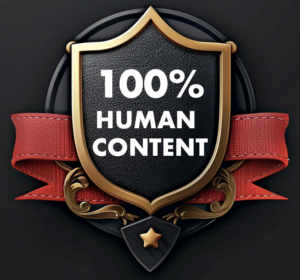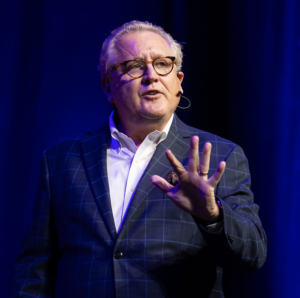
I was recently interviewed about my perspectives on work-life balance and shared the story of my early career, when I juggled family, a demanding job, and an MBA program. For nearly four years, I had zero time for “me.”
The interviewer asked: “If you could give one piece of advice to your younger self who worked so hard to climb the corporate ladder, what would it be?”
I know he was expecting me to look back with regret, maybe even say I’d wished I’d worked less or spent more time at home. But honestly, I couldn’t say that. It wouldn’t be true.
Here’s what I said: I would tell my younger self, “Good job.”
That threw him for a loop. Let me explain my answer.
The chicken and the egg
In his famous book Good to Great, Jim Collins describes his concept of a career flywheel.
“Picture an egg just sitting there. No one pays it much attention until, one day, the egg cracks open and out jumps a chicken!
“All the major magazines and newspapers jump on the event, writing feature stories—“The Transformation of Egg to Chicken!” “The Remarkable Revolution of the Egg!” “Stunning Turnaround at Egg!”—as if the egg had undergone some overnight metamorphosis, radically altering itself into a chicken.
“But what does it look like from the chicken’s point of view? It’s a completely different story.
“While the world ignored this dormant-looking egg, the chicken was evolving, growing, developing, incubating. From the chicken’s point of view, cracking the egg is simply one more step in a long chain of steps leading up to that moment—a big step, to be sure, but hardly the radical, single-step transformation it looks like to those watching from outside the egg.
“It’s a silly analogy, granted. But I’m using it to highlight a very important finding from our research. We kept thinking that we’d find “the one big thing,” the miracle moment that defined breakthrough. We even pushed for it in our interviews. But the good-to-great executives simply could not pinpoint a single key event or moment in time that exemplified the transition.”
The career flywheel
Jim Collins famously described this as the flywheel. What creates personal transformation and career momentum? Is it one big push that creates velocity? One class, one connection, one stroke of luck?
 No. He found it was a combination of small pushes that created momentum for both careers and businesses. You push and push and push, and that work accumulates to create momentum (I describe this in my book Cumulative Advantage).
No. He found it was a combination of small pushes that created momentum for both careers and businesses. You push and push and push, and that work accumulates to create momentum (I describe this in my book Cumulative Advantage).
Early in my career, I was motivated by money. I would not say I grew up poor — I never went hungry. However, if I wanted to have a bike, new clothes, or a baseball uniform, I had to earn the money myself. Likewise, I had to pay for my own college education and subsisted on beans and cheap pasta for years.
After years of scraping by, I wanted some financial freedom. I was so tired of being broke. And my flywheel was already in motion.
Beginning the momentum
In college, I was part of a marketing student group, and my job was to get guest speakers for our monthly meetings. I researched the largest companies I aspired to work for one day and invited their executives to campus. I was their host for the day, which allowed me to build personal relationships with people who could potentially hire me.
In fact, I secured an internship through a connection with one of these executives. By the time I graduated, I had three corporate internships under my belt. Each internship was bigger than the last, and they paid more because I was building on the momentum of the previous job.
By the time I was a college senior, I had an impressive resume and landed a corporate communications job with a Fortune 100 company. Problem was, I wanted to move into marketing, and that would require something more.
From sales to marketing to momentum
My first move toward a marketing career was to spend time in sales. I was transferred to our Los Angeles sales office and learned about a special MBA program that allowed students to study under the legendary Peter Drucker. I applied twice and was turned down because I was too young for this elite experience. Finally, I met with the dean and explained how my youthful perspective would add to the diversity of the program. He laughed, but let me into the program as the youngest student ever admitted.
This brings us back to where this blog post began. I now had a challenging career, two toddlers, and an MBA program to balance. This was the most demanding period of my life. It took me four years of nights and weekends to get that degree. One of the hardest things I’ve ever done.
If you know me at all, you know I’m great with kids and adored being a father, so I always kept this in front of me as job number one.
All of this was part of my career flywheel. I moved up the company, and, long story short, gained the knowledge and experience that have enabled me to have the career I have today.
And this is why my answer was so unexpected and not-so-politically-correct. I don’t regret working hard to build momentum in my career because it has led to a lifetime of benefits and financial freedom.
Simple math
Let’s put this in simple terms.
Because of the “flywheel work” I did in college, let’s say I could get a job that paid $60,000 while my less aggressive friends earned an entry-level job of $45,000.
If we both received a 5% annual raise for the next 20 years, my flywheel-enabled salary would be approximately $152,000, compared to $114,000 for the other person.
And of course, there is more than money. The flywheel momentum also led to promotions, travel, more time off, and opportunities for my children that I had never had before.
I want to be clear. I’m not saying that everybody needs to work hard, build momentum, and make money. I hope you’re happy in whatever you do.
There’s no one-size-fits-all path. But for me, the hard work I put in early built momentum that changed my life –and gave me more freedom, not less, as the years went on.
If you’re working on your flywheel, keep going. Step by step, you’re building something bigger than you can see right now.
 Need a keynote speaker? Mark Schaefer is the most trusted voice in marketing. Your conference guests will buzz about his insights long after your event! Mark is the author of some of the world’s bestselling marketing books, a college educator, and an advisor to many of the world’s largest brands. Contact Mark to have him bring a fun, meaningful, and memorable presentation to your company event or conference.
Need a keynote speaker? Mark Schaefer is the most trusted voice in marketing. Your conference guests will buzz about his insights long after your event! Mark is the author of some of the world’s bestselling marketing books, a college educator, and an advisor to many of the world’s largest brands. Contact Mark to have him bring a fun, meaningful, and memorable presentation to your company event or conference.
Follow Mark on Twitter, LinkedIn, YouTube, and Instagram
Illustration courtesy Mid Journey


